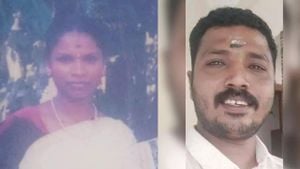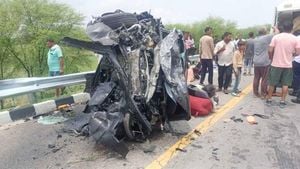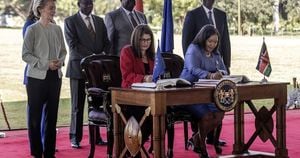Prime Minister Narendra Modi is currently making headlines with his recent activities and statements as he continues to strengthen India’s global ties and address pressing domestic issues. His recent trip to Guyana has drawn attention not just for its significance but also for the emotional connections he made during his address.
During his monthly radio program, Mann Ki Baat, Modi spoke passionately about the Indian diaspora, stating, "Thousands of kilometres away from India, a ‘Mini India’ dwells in Guyana too." This statement reflects the deep-rooted bonds between India and its overseas communities, particularly the Indian-origin population who have been influential across various sectors in Guyana—be it politics, education, or business. Modi emphasized the proud legacy of the Indian community, noting the contributions made since their arrival as indentured workers around 180 years ago.
Guyanese President Irfan Ali, who also boasts Indian heritage, has been instrumental in fostering these connections. Modi's visit to Guyana marked him as the first Indian Prime Minister to visit the nation in 56 years, which was celebrated with the bestowal of the country's highest civilian honor, the 'Order of Excellence'. His reflections during the address illuminate how far the Indian community has come, leading and shaping their society.
But Modi’s international engagements didn’t stop there. He also highlighted noteworthy projects involving the Indian diaspora, particularly one focused on Oman. Here, he referenced hundreds of years of Indian settlement, particularly from Kutch, Gujarat, and how these communities continued to thrive and maintain their cultural identity. Modi noted, "With the support of the Indian Embassy and the National Archives, we are preserving their history." He described how the campaign to collect diaries, letters, and other documents dating back to 1838 reflects the joys and sorrows of their lives as they established trade links with Oman.
Modi shares these narratives to convey the importance of recognizing Indian contributions across the globe, reinforcing India’s international heritage and influence.
Looking closer to home, Modi is set to lead discussions at the upcoming All-India Conference of Director Generals and Inspector Generals of Police, scheduled to take place from November 29 to December 1 in Bhubaneswar, Odisha. This will be the first time the DGP and IG conference will be held in the state, bringing significant administrative focus to local security concerns.
During this three-day event, Modi will address key topics such as internal security, the fight against cybercrime, and the Maoist insurgency—issues constantly at the forefront of India’s law enforcement challenges. An interesting aspect of the conference will be the exploration of new threats posed by artificial intelligence and drone technologies. With participation from high-ranking officials like the National Security Advisor Ajit Doval and chief officers from several agencies, the discussions promise to be insightful and impactful on national strategies moving forward.
The increasing complexity of security issues reflects broader concerns about governance and public safety. With various technological advancements presenting new challenges, leaders will need to brainstorm innovative solutions to address them effectively and maintain the peace and security of citizens.
Despite Modi's busy schedule abroad and domestically, he continues to promote unity and strength through these interactions. His focus on the Indian diaspora during his broadcasts intertwines with India’s broader geopolitical interests, showcasing Indians as soft power ambassadors globally.
It is also worth noting Modi's push for women-centric initiatives and social upliftment projects, which underline his administration's commitment to inclusive governance. These efforts are indicative of significant developmental policies aimed at fostering equality and driving socioeconomic growth.
The Prime Minister remains optimistic about the future, and his activities reflect broader aims of bolstering India’s position on the world stage through active diplomacy and community engagement. His narrative emphasizes resilience, unity, and the importance of India’s diaspora, as he melds the past with aspirations for the future.
Emphasizing the multicultural aspects, Modi's recent statements remind everyone of the broader Indian family spread across the globe and the shared essence of 'Indianness' they carry.
With Modi's current engagements and his planned discussions at the DGP conference, he aims to navigate India through both historical ties and contemporary challenges, fostering connections and building strategies for future growth.
Through all these activities, it is clear Modi seeks to maintain India’s presence not only as a regional power but as a pivotal player globally—further enriching the fabric of its diverse culture with every step taken on the global stage.



